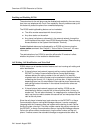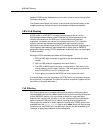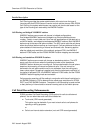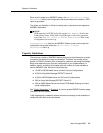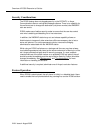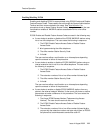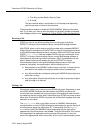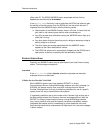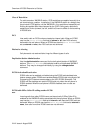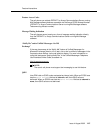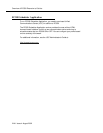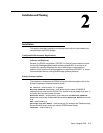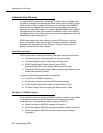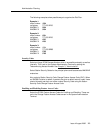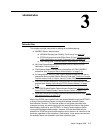
Overview of EC500 Extension to Cellular
1-14 Issue 4 August 2002
Class of Restriction
For calls toward an XMOBILE station, COR restrictions are applied normally for a
call terminating to a station. In particular, if the XMOBILE station is a bridge, then
the principal’s COR applies, not the XMOBILE’s. Any restrictions imposed by call
filtering are applied after those imposed by the COR. Calling party restrictions
pertaining to trunks (outward, tac-toll, and all-toll) have no affect on the launching
of EC500 calls.
DCS
Inter-switch calls on DCS trunks are treated as internal calls. When an EC500
user has the
Calls Allowed field set to internal or all, then DCS calls are
delivered to the cell phone. When an EC500 user has the
Calls Allowed field
set to
external or none, then DCS calls are not delivered.
Distinctive Alerting
Cell phones do not receive distinct rings for different types of calls.
Duplication Station Administration
Use the duplicate station command for the bulk administration of XMOBILE
stations. The
Calls Allowed field defaults to all for all duplicated XMOBILE
stations. They may be changed individually by using the
change station
command.
EC500 Activation/Deactivation
EC500 calls can be enabled or disabled using the EC500 activate/deactivate
feature access codes. EC500 users enable/disable EC500 calls using Avaya Call
Processing (ACP) feature access codes or the UCC-EC500 Scheduler. The
EC500 call filter settings can restrict EC500 calls only when the cell phone is
EC500 enabled. When the cell phone is EC500 disabled, then no calls are
delivered.
EC500 with Office Caller ID calling another EC500
user
Incoming calls from other EC500 users are internal calls if Office Caller ID is
enabled for the XMOBILE station associated with the cell phone. When an EC500
user has the
Calls Allowed field set to internal or all, then the EC500 calls are
delivered. When an EC500 user has the
Calls Allowed field set to external or
none, then calls from other EC500 users are not delivered.



